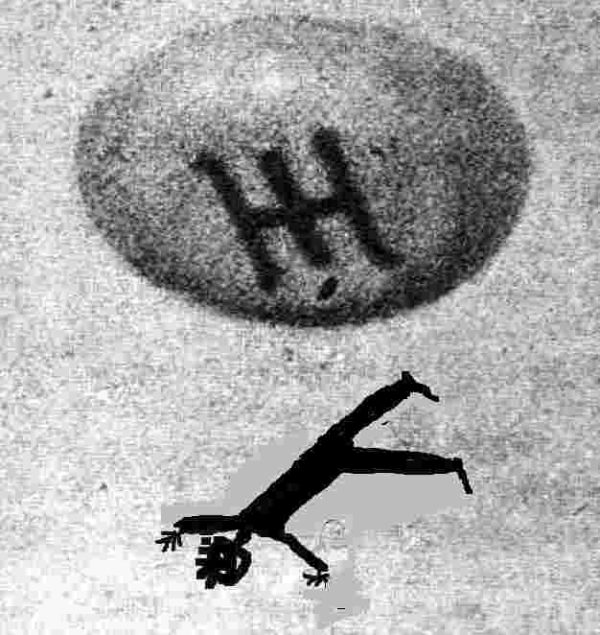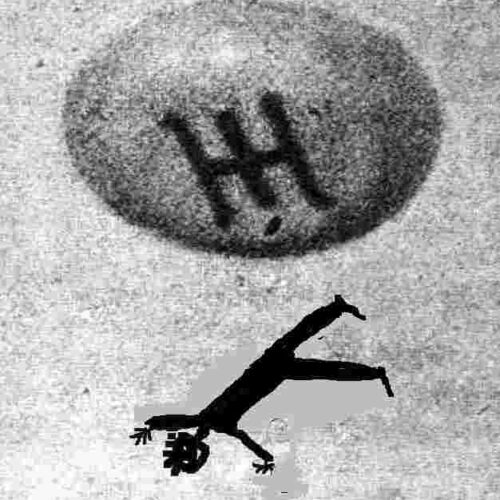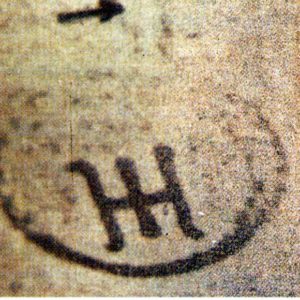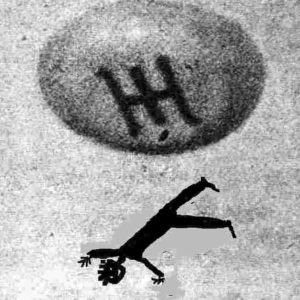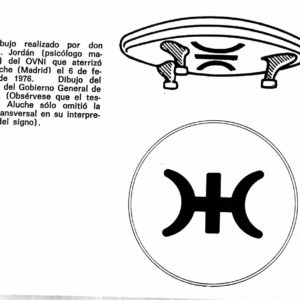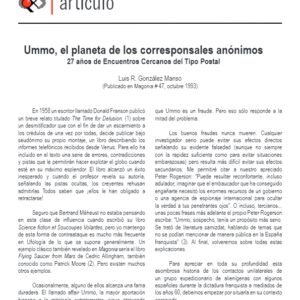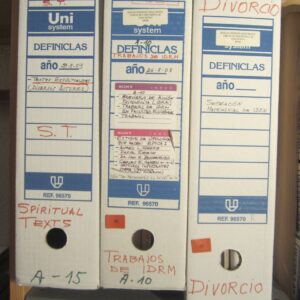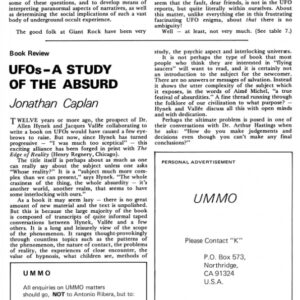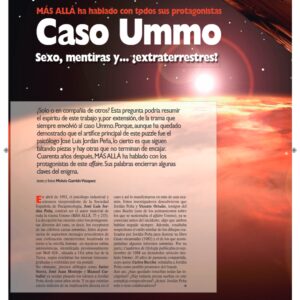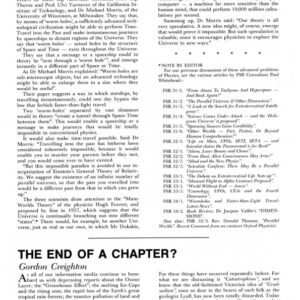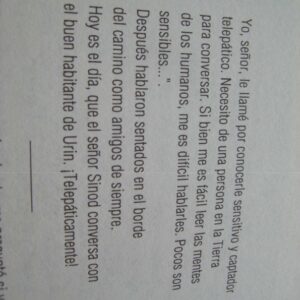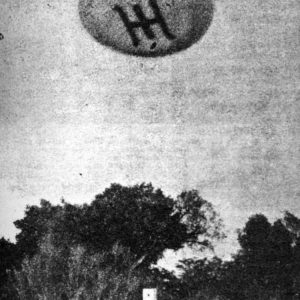Hijas de UMMO Enzo Daedro
- Descripción
Descripción
Hijas de UMMO Enzo Daedro
UMMO’S DAUGHTERS
As the end of the 20th century recedes into memory millennialist cults have not disappeared, despite the failure of the predicted apocalypse. Sociologists and cult-watchers have been wondering what new catastrophes the prophets will come up with to hold on to their congregations. ENZO DAEDRO has observed just such an adaptation in the Daughters of Ummo, little known outside Bolivia, whose beliefs are disturbingly similar to the Heavens-Gaters, and who have just postponed the End of the World, as we know it, to the summer solstice in 2033.
While attending a UFO symposium in Mexico in 1994, I had the honour of meeting a Portuguese lady (whose name I can’t reveal) who wished to discuss with me a problem she had encountered during the previous year. We met in a bar in the Federal District and, for two hours, she spoke of her concerns about a strange Bolivian cult called the Daughters of Ummo. This was the first I’d heard of the group although, as a ufologist, I was familiar with the Ummo mystery (see article below). When I explained that I couldn’t investigate this group immediately because I had to complete some work in Chile, the lady became very nervous and left without another word.
I didn’t finish my Chilean magazine assignments until the following year, but in the summer of 1995 I travelled to Bolivia to find out what I could about Ummo’s Daughters. My stay was brief, but while I was there I met an old friend, Ramón Lafañe, who worked for a local newspaper. He immediately warned me that investigating the sect was likely to be dangerous. “If I were you, I wouldn’t bother,” he said. “Dinovi Gutierrez does not allow anybody to investigate her affairs.” I asked him who this Gutierrez woman was. “She’s the president, an elderly but dangerous woman. Forget all about it, Enzo!” I took his advice and returned to Buenos Aires and my other assignments.
Several years later, in 1998, I received an odd message by e-mail. It came from a woman who called herself ‘Cornopus 77’. She claimed to be a member of the Bolivian Daughters of Ummo and invited me to visit their headquarters in La Paz, Bolivia. I refused immediately, which turned out to be a mistake. Soon I was receiving a steady flow of communications reporting, in some detail, the social, political and religious life of the Ummite civilisation and their origins in the area around the star Wolf 424. Naturally, I filed all the documents.
Under this bombardment, I began to feel threatened. I closed down my mailbox, but somehow the torrent of antagonistic messages from Cornopus 77 continued unabated. I wondered if she had contacts in Argentina watching me. With a new feeling of determination, I tidied my papers and cleared the decks for a serious inquiry. Very well, the Daughters of Ummo had made a new enemy! I read everything I could about Ummo, including Antonio Ribera’s history and analysis of the original Ummo enigma in the mid-1960s and how it had mystified Spanish ufologists for nearly three decades. Although now known to be largely a clever and sustained hoax, the Ummo mystery has been endlessly exploited and promoted to the credulous over the years. The Ummite mythology, even if only the product of a highly inventive imagination, exerts a fierce grip on the minds of its believers and its power should not be underestimated.
In essence, the Daughters are brainwashed into believing that the Ummites who came to Earth represent a race of superior beings who are somehow, simultaneously, both extraterrestrial entities and their own ‘fathers’ and ‘mothers’. The Daughters conduct rituals worshipping the Ummites and believe they have been empowered to do their will, to prepare the planet for a new, larger invasion of Ummites in the year 2033.
The Internet proved invaluable; it allowed me to correspond with veteran investigators who had received similar volumes of communications from the original Ummite sources and who told me of their concerns about this modern cult which has based itself on the original Ummite archive. But it also brought emails from other Daughters, calling themselves ‘Beotho 55’, ‘Soromon 44’, and ‘Lawwae 92’.
In March 1999, I received a new and totally unexpected Ummite document; this time it was from Florencia Dinovi Gutiérrez, the organisation’s apparently fearsome president. I must come to Bolivia immediately, she demanded, because I had been accepted to enter the organisation as an “external contributor”. My research into the history of Florencia Dinovi Gutiérrez led to a mental hospital in Peru from which, some years back, a woman answering her description had absconded while being treated for millennialist obsessions and hallucinations about aliens. To check the possibility that this notorious patient might have been Gutiérrez, I spoke to Dr Horacio Torna at the hospital. He listened patiently as I described the beliefs of the Daughters of Ummo and their leader. “It’s her,” he said hoarsely. “It’s Juana Pordiavel!” This identification was confirmed after the doctor cautiously sent me some pages from Pordiavel’s personal file, with the condition that I wouldn’t publish them.
Juana Pordiavel (left) was born in Cuzco, Peru, in 1912, to a humble peasant family. When she was 12, she left home claiming that her father had abused her. She lived rough in the streets by begging, until a Spanish priest – Hermenegildo Abustín – took pity on her condition and invited her to live in the church. This act of kindness was a major turning point in her life; Hermenegildo believed Juana had the potential to become a nun and became her tutor. In return for cleaning the church, the priest bought her books and encouraged her intellectual development. He remembers her reading biblical texts with passion and, in time, becoming more confident about her culture and language. By the time she left the church, aged 19, her belief in fundamentalist theology was informed by her general dissatisfaction with life, providing the ideal ingredients for a future sect leader.
Pordiavel spent some time in a mental hospital in 1941 and eventually met Carlos Opanova, who, despite suffering from a few mental problems of his own, was leader of a fanatical spiritualist organisation called ‘The Deer of the Sixth Christ’. They fell in love and married. In 1963, the Deer moved to Oruro, in Bolivia, where they took over (or squatted) a building, calling it ‘The New Heavenly Jerusalem’. The group’s nocturnal ceremonies began to annoy the neighbours, who complained of hearing strange voices in the nights and of missing children. At some time during this period, Pordiavel was again interned in a mental hospital.
When the curiosity of the police became too intrusive in 1967, the Deer fled their ‘Heavenly Jerusalem’ in scattered groups. Taking a big chunk of the organisation’s money, Juana and Carlos bought a small flat in La Paz and began to re-invent themselves. Carlos had been corresponding with the Spanish ufologist Jiménez del Oso, who sent them copies of many of the original Ummite writings – which proved to be a revelation to Opanova. Dazzled by the Ummite picture of a better world, a world that could be theirs, Opanova decided to adopt the philosophy and teachings of Ummo. From now on Opanova’s disciples would be devoted to the emulation of all things Ummite.
And so, in 1969, the Deer finally became the Daughters of Ummo. Juana baptised herself Florencia Dinovi Gutiérrez while her husband took on the persona of ‘Yiewaka’, an Ummite ‘father’ on Earth. The sect grew beyond their wildest dreams, taking advantage of cruel social circumstances; as much as 90 per cent of its members are drawn from the poor and uneducated, many recruited directly from the streets. Apparently, the Daughters are not puzzled by the contradiction of Opanova being both Juana’s husband and an incarnate Ummite appointed as president and ‘father-in-law’ of Earth; to them it is part of the unquestioned mystery.
As the new cult became more established, there were arguments with priests from the local Catholic Church. Dinovi reacted by renouncing her Catholic heritage and, in a dramatic nocturnal caper, dispatched two of her disciples to steal the chalice and wafers from a church. She took her revenge by urinating on them. A madness similar to ‘speaking in tongues’ (glossolalia) possesses her. She mutates the language of Ummo and gives members strange names such as Cornopus, Soromon, Aweea, Lawwae, and Beotho. (The addition of numbers denotes a ranking system for appointments, the most senior being 44, then 77.)
An emailed warning (panel, left) was aimed, mainly, at the editor of the Buenos Aires-based UFO journal Crónica and Mr Lurchuk, creator of the website ‘The Invisible Dragon’.
Last summer (2000), I received an e-mail from none other than Ummo’s ambassador to Earth, Yiewaka. I reproduce this singular and disturbing letter in full as it gives a flavour of the group’s mentality:
MESSAGE TO THOSE WHO HAVE BLASPHEMED THE INTEGRITY, THE MORALITY AND DISCIPLINE OF OUR ORDER. HEAR THE MESSAGE FROM THE SUPERIOR FATHER OF UMMO, YIEWAKA, THE WISE.
Mr Jorge M Iglesias, Mr Carlos A Lurchuck, Mr Enzo Daedro, Mr Sebastián Jarrè, Mrs Annabel Ascar, Mrs Victoria Palacio, Mr Miguel A Gómez, Mrs Mirtha Allende de Pace, Mr León Samaritano, Mrs Héctor Braum, Mr Ernesto Luppi, Mr Antonio R. López, Mr Leonardo Finse and Mrs Manuela Calaña… …among others. They have been highlighted because they slandered in a grotesque and miserly way our organisation’s integrity.
Due to “misunderstandings”, wrongly delivered information, “ghostly” informants, etc. they believe and express, with the harmful and loud voice that may exist over the face of the Earth, that the words pronounced by the Bolivian Daughters are a consequence of a “psychotic end-of-century decadence”.
What these individuals don’t understand is that they fear the UNKNOWN. As none of them (except for Mr Samaritano) has approached us to understand the meaning of our message, they have been influenced by race and phobic feelings. It’s a pity that this kind of persons survived THE LAST IMPRESSION (1987).
We, blood Ummites, believed that the human race had overcome the problem of living together, and that peace and truth were guiding you. We are disappointed at your unjustified actions. The only course left to us is to: DELAY THE 2033 AGREEMENT.
We feel sorry about that. You have not reached the expected level. That’s why we will communicate with your leaders, governmental and religious, to give them the bad news. The Interplanetary Agreement that took a lot of effort by my predecessor, WALAKEA, to arrange will now terminate.
What have you gained by this? The human race will not have the privileges of belonging to our nation. As for Echelon and Merc 9, we will dismantle the units and the programs will no longer be in use. Nordic and African Ummo’s Daughters, sent directly from Ummo’s Capital, will help us, with great sorrow, to end the hydroelectric services. Many cities will suffer the effects of this aggression against our holy organization.
YIEWAKA
UMMO’S FATHER
—–FINISHED REPORT.
0-2321 – XIJASXUMMOX – HEAD OFFICE 034 – BOLIVIA.
Others, like myself, come further down the list. It seems that Yiewaka (aka Carlos Opanova) is furious with the unenthusiastic, suspicious and even scornful responses to the Daughters’ propaganda programme. What did they expect after Dinovi Gutiérrez (aka Juana Pordiavel) emailed serious threats to most of the list, warning that if they did not join the sect they would die in some terrible Dantesque hell? Applause?
The Last Impression – mentioned in the letter – is believed to be the mass abduction of a huge number of people from many countries, supposedly to Ummo. The impending event, called the ‘2033 Agreement’, appears to mean the next wave of Ummite immigration, which Yiewaka threatens to postpone. Various unnamed governments are claimed to be accomplices in the event which seems to be planned as a silent invasion. The letter also refers to two other groups – Nordic and African Ummo’s Daughters – but despite serious effort, I have not been able to find out anything about them.
The most significant development came from a mole within the Bolivian sect – to protect his identity I will call him ‘S’ – who has been keeping me informed about their structure, beliefs and behaviour. Every year they embark on a public drive to recruit new members. They set up a table in a plaza near their headquarters in La Paz(see photo, right) which is attended by two Daughters specially trained to lure passers-by with false promises and expectations. Anyone can apply to join once, explained ‘S’, but if they fail the exam, they will never be allowed another opportunity.
When 30 applicants have been chosen, they are housed in a courtyard in the headquarters for the induction lecture. Soromon 44 – one of Dinovi’s chief secretaries – takes the stage to thank them for “accepting the call.” She shakes hands with the males and kisses the females before inviting them into the interior of the building. With no knowledge of what is about to happen to them, they take a step into the unknown.
The initiation attended by ‘S’ took place in a dark and depressing cellar. Soromon 44 closed the door slowly and they stood for some minutes in silence. Suddenly, a formal voice coming from a loudspeaker ordered them to separate into male and female groups. (According to ‘S’, at least 80 per cent of those present were woman). Then, as bright lights were switched on, about 15 Daughters entered the cellar from doors on both sides, handing out triangular green hats to the women and violet hats to the men. All were asked to kneel down and put on the hats; as they did so the Daughters left the room and all was silent for some time.
‘S’ and his fellows then heard a faint chanting. A blue light came on, illuminating the president Florencia Dinovi Gutiérrez, standing there in a long red gown with a green Ummo logo on both shoulders. Humming and roaming among the women, Dinovi selected one, seemingly at random, drew her to the centre of the room and asked her to uncover one of her breasts. The chosen woman obeyed as if she had been hypnotised. Dinovi produced a dagger from her clothes and pricked the woman’s nipple until it started to bleed. A Daughter ran to them to gather some of the blood. As the woman was laid on the floor, Dinovi began singing: “Walae! Walae! They are here for you. Yiewaka, stellar lord, open your mind and let them enter your glory. Walae! Walae!” Dinovi asked the newly-bled woman and ‘S’ to stay and talk with her while the rest were taken to their rooms. Despite his overwhelming anxiety, ‘S’ was determined to stay and infiltrate the group.
The Owwa – the ‘Book of Imperfection’ – is the pillar of Ummite beliefs. It was originally written by Carlos Opanova, adapted partly from his spiritualist writings for the defunct Deer of the Sixth Christ and partly from the voluminous texts attributed to the ‘White Brothers’ of Ummo. It is the sect’s bible. The Ummite day begins at 7 o’clock in the morning with a compulsory reading of the Owwa. A sixth-grade Daughter then chooses a newer member to give her interpretation and, if this is unsatisfactory, the hapless member is confined in a cellar lock-up for a period specified by the group’s laws.
After a light breakfast – usually a cup of milk and some rye bread – members go about their appointed tasks and work till 8:30pm. Bedtime is 9 o’clock. Sexual activities are not allowed except on application to the Daughter called Waooa 11, who seeks permission from Dinovi Gutiérrez. Members are generally allowed one day a week to themselves. Advancement in the early grades is down to hard work, long hours and a thorough indoctrination in the Owwa. Most days, the elderly Dinovi Gutiérrez shuts herself in her large office where she uses a powerful computer to maintain the group’s website. There, she also targets prominent individuals with a constant stream of emails, seeking to recruit them or obtain their help in spreading the Ummite message. Dinovi is served by four secretaries – Soromon 44, Waooa 11, Cornopus 77 and Lawwae 22 – who look after their leader’s daily needs and the sect’s affairs, including its economic and political administration. They receive prominent guests and organise street sales of clothing and food.
It is hardly a secret that the elderly priestess still has a voracious sexual appetite; She receives regular visits from a ‘taxi-boy’, an adolescent who has been given the name Nuwuo (or ‘innocent’ in the Ummite language). ‘S’ is concerned that, at present, the boy seems to be missing. Dinovi/Pordiavel’s most recent spell in a mental hospital, in 1984, was precipitated by a serious vaginal infection. You may wonder why ‘S’ didn’t simply go straight to the police and ask them to put a stop to the Daughters’ expanding activities. In fact, he tried to get the local police to understand the dangerous aspects of the sect – that they were depriving their members of their freedom and inciting them to acts of robbery, deceit and violence – but was rebuffed and refused any help.
On one occasion, he was even hit by two policeman when he was on his way to give evidence. No court or embassy has taken any account of what he has so far revealed, so he has determined to continue his infiltration of the Daughters in order to gather the necessary proofs. Thanks to ‘S’, we now know, for example, that the Owwa recommends inducting at least three children each year, without the knowledge or consent of their parents. We hope he is successful in heading off the prophesied disaster.
THE UMMO MYSTERY
Who pulled off the most successful hoax in ufological history? BOB RICKARD summarises a 27-year Close Encounter of the postal kind.
Some time around the end of 1965 and the beginning of 1966, a number of Spanish UFO enthusiasts received anonymous communications claiming to come from an “extraterrestrial expeditionary group” from the star Wolf 424 on a mission to Earth. The letters had been posted from various countries – including Spain, Australia, Canada, Switzerland, and Germany. Each was ‘authenticated’ with a strange logo designated the seal of “the Unified government of the planet Ummo.” (Apparently the design was inked onto a fingertip, then used to ‘stamp’ on the letters.)
In their first years on Earth, the Ummites said, they had pursued scientific research, including breaking into houses and anæsthetising the inhabitants to take samples of hair and vaginal mucus; this was before the topic of abductions by the Grey gynæcologists became well known and two years before John Fuller’s The Interrupted Journey was published in Spanish.
The Ummo papers (see example, right) were truly mystifying; they appeared to be skilled  expositions, displayed a wide knowledge of science and philosophy and did not look like the ravings of lunatics. Over time, several hundred letters were received, some of them voluminous and illustrated manuscripts. Occasionally, someone received a phone call; the Ummite voice was curiously mechanical, as though deliberately distorted. Religious matters were dealt with historically – for Catholic readers, there was the added interest of learning about an ancient Ummite parallel to Christ in ‘Ummowoa’, a prophet whose body vanished from the table on which he was being vivisected by order of an evil Empress – but, behind the unverifiable and convoluted tracts about alien philosophy and the science of Ummo, was a sentiment that was clearly anti-Franco in its description of a utopian society that was a strange mix of communism and the “American way of life”.
expositions, displayed a wide knowledge of science and philosophy and did not look like the ravings of lunatics. Over time, several hundred letters were received, some of them voluminous and illustrated manuscripts. Occasionally, someone received a phone call; the Ummite voice was curiously mechanical, as though deliberately distorted. Religious matters were dealt with historically – for Catholic readers, there was the added interest of learning about an ancient Ummite parallel to Christ in ‘Ummowoa’, a prophet whose body vanished from the table on which he was being vivisected by order of an evil Empress – but, behind the unverifiable and convoluted tracts about alien philosophy and the science of Ummo, was a sentiment that was clearly anti-Franco in its description of a utopian society that was a strange mix of communism and the “American way of life”.
The first recipients of the Ummo missions were loosely associated with the Sociedad de Amigos de los Visitantes del Espacio (Friends of Space Visitors Society) formed by Fernando Sesma to discuss UFOs and extraterrestrials. In 1970, a number of these recipients formed their own organisation, called ERIDANI, to study the Ummo case. Several of them wrote books – including Fernando Sesma’s Ummo: Another Inhabited Planet (1967) and Looking Toward The Edge Of The Universe (1968) by Father Enrique Lopez Guerrero, the best known outside Spain being Antonio Ribera’s The Ummo Mystery (1975). The authors differed widely in their opinions of the origin of the letters and the meaning of their contents, but they agreed on their extraterrestrial origin. The only alternative considered was that the letters were part of some kind of social engineering experiment perpetrated by an unknown intelligence agency – the KGB, the East German Stasi, the CIA and the Vatican organisation Opus Dei were all mooted, even by the Ummite letter-writer.
The Ummo phenomenon remained relatively unknown outside the Spanish ufological community until September 1968, when Father Enrique Lopez Guerrero drew the attention of the world’s press by publicly denouncing the Ummite aliens’ presence on Earth. The few British and American ufologists who commented on the Ummo mystery were divided; while most thought it a hoax, others embraced it excitedly. In Spain at least, it was taken seriously and has been a perennial topic of the press, radio and TV ever since.
After Franco’s death in 1975, the frequency and quantity of letters decreased but they continued to denounce capitalism, American military policy, etc. A few serious Spanish ufologists – such as Ballester Olmos and Ares de Blas – had never accepted the documents or photos and at least one journal – Stendek, the bulletin of the main ufological Spanish organisation, Centro de Estudios Interplanetarios (CEI) – denounced Ummo very early on. In the 1980s, a new generation of French and Spanish ufologists began to re-evaluate the Ummo archive, eventually concluding that the chief culprit was not an alien but none other than Jose Luis Jordan Peña, the chairman of ERIDANI itself.
Senor Peña strongly denied it and continued denying it until April 1993, when he astonished many people with a sudden and definitive admission of guilt. In a statement to Spanish journalists and ufologists, he confessed: “I am the man who has written the letters from Ummo.” However, he steadfastly refused to discuss his motive, political intentions or what he hoped to achieve by this hoax. As Peter Rogerson noted (in Magonia 43), the writings were “samizdat literature, saying things which could not be said openly in Franco-ist Spain.” Luis R González Manso, a Spanish ufologist who has made a special study of the Ummo case, and his colleagues have identified at least one accomplice; there may have been others.
Today, references to the Ummo hoax in British and American ufological literature are few and far between – a curious oversight given the important role the case has played in French and Hispanic ufology. But who was this mastermind behind one of the greatest UFO hoaxes ever? Luis González told FT that Jordan Peña was well placed to perpetrate the hoax. He had a degree in telecommunications and worked for one of the largest Spanish building societies but had, for years, maintained a keen interest in cultural anthropology, philosophy, the sciences and the history of religions; he also learned several languages and was one of the founders of the Spanish Parapsychology Society. He has variously described himself as an agnostic, a sceptic and a psychologist.
Writing in Magonia 47 (October 1993), González says it is important to take account of the expectant atmosphere of the period between 1952 – when George Adamski met alien beings in an American desert – and the onset of the Ummo phenomenon in 1966. In 1954, alone, there were similar contact claims to Adamski’s from Coniston (England), Oeydalen (Norway), Natal (South Africa) and Madrid (Spain).
In the Madrid case, male nurse Alberto Sanmartin claimed to have been given a ‘Space Stone’, covered with strange signs, by an alien. Significantly, a few weeks earlier, articles about UFOs (including mention of Adamski) had been published in a local newspaper. Their author was Fernando Sesma, a postal worker and self-appointed ‘professor’ of cryptography and graphology, who went on to see his first UFO in 1961 and, the following year, claimed to have received letters from an ET called ‘Saliano’, from the planet Auco, orbiting Alpha Centauri. This is the very same man who was destined to be one of the first to receive Ummo papers 12 years later.
April 1964 saw the famous UFO encounter at Socorro (USA); according to ufologist Jacques Vallée, the symbol on its fuselage was the Arabic sign for Venus! That same year, an associate of the well-known writer on ancient mysteries Robert Charroux began to receive letters from immigrants from Proxima Centauri, who called themselves ‘Baavi’, detailing their civilisation, language and science. In 1965, another possible precursor of Ummo appeared in the first volume of Frank Herbert’s Dune, destined to be a huge cult SF classic. It included the word ‘Umma’, defined as “one of the brotherhood of prophets (a term of scorn in the Imperium, meaning any ‘wild’ person given to fanatical prediction).”
Senor Peña’s (left) involvement seems to have begun on the evening of 6 February 1966 – about the same time the USAF were deliberating ‘Project Blue Book’ – when a large luminous object flew over his car as he was driving home in Madrid. On the object’s belly he noticed a curious design, rather like the alchemical symbol for Uranus. Strange ground marks were found at Aluche, on the city outskirts, and attributed to the UFO landing there. On 1 June 1967, a man came forward saying he’d photographed a UFO hovering over San Jose de Valderas and, wonder of wonders, it too bore the secret icon of Ummo!
Sesma’s group was as ecstatic as they were credulous, seeing in the San Jose de Valderas visitation vindication of all their hopes and speculation. At some point, Peña joined the ‘Friends’ and quickly rose to a position of influence. He would have known of Sesma’s contact with the alien from Alpha Centauri and, as an insider, had a unique opportunity to have further fun with this group of ET-believers. The Aluche and San Jose de Valderas incidents seem to implicate Peña by association and he could have easily crafted his accounts of them to substantiate the Ummo mythology.
This is González’s theory: he believes that the first phase of the hoax lasted just over a year – from February 1966 to July 1967. “I maintain that it all began as some kind of joke that later got out of hand,” he concludes. “The real mystery is why so many people had believed in them for so long.” It was not until some of the ERIDANI group began to consult or compare notes with more sceptical ufologists outside their circle or overseas that they began to notice significant errors in the epistles from Ummo. One of the first was also one of the most serious; Wolf 424 is described as a two-planet solar system, while astronomy shows indisputably that it is a binary system with twin stars.
As to why Peña chose the star Wolf 424 as the home of his alien master race, Luis González told FT that even Peña probably did not know the answer. “Perhaps he was crying ‘Wolf’? The ufologist Donald Keyhoe once suggested that aliens could come from Wolf 359, so maybe Peña simply changed the digits?”
With hindsight the clues are quite visible. The Ummites plagiarised passages from the writings of Isaac Asimov and Martin Gardner, and had once bizarrely suggested that the British humourous magazine Punch was behind the whole Ummite mythos. A close inspection of the impressive Ummite tracts on science reveals them to be gobbledegook. But suspicion should have been aroused by the original account of their first landing, near the town of La Javie, at the base of the Alps (about 53 miles (85km) northwest of Cannes) on 28 March 1950.
According to Luis González: “It is a long story (49 pages), a masterful piece of work. The reader is absolutely touched when the [Ummites] discover their first human artifacts – ‘some fragments of white-yellowed, flexible and brittle sheets… full of characters… and stained with fæces’ – and attribute to it ritual meanings. It is really too much,” he adds, sadly, “that the first document preserved for galactic posterity turned out to be some pages of the French newspaper Le Figaro used as toilet paper by a peasant.”

